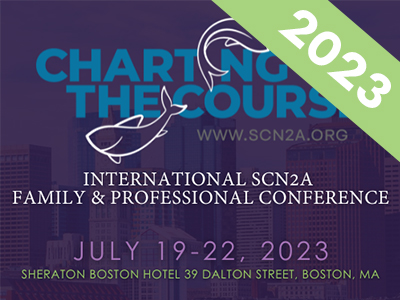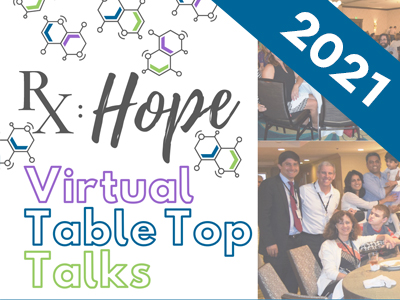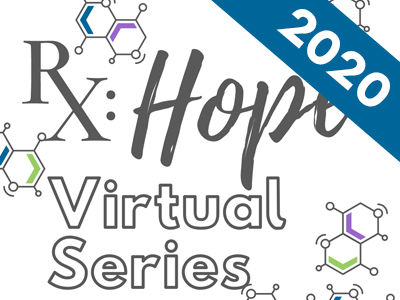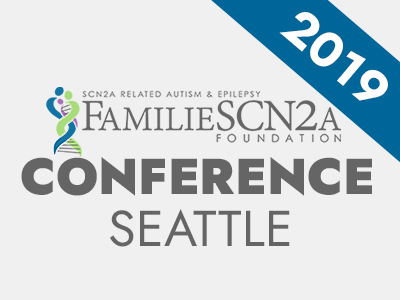Participation in research is our greatest hope for better treatments and cures for all SCN2A-related disorders! To accelerate research, the best thing patients and their families can do is to learn about their SCN2A variant and available research projects. Here you will find educational resources on research and drug development processes, clinical trials, and SCN2A-specific projects. To stay up-to-date, please join our email list.
SCN2A research projects & treatment pipeline
The following research projects and clinical trials will bring us closer to understanding this complex sodium ion channel disorder and closer to improving treatments and finding cures. Our collaborative approach to SCN2A research has led to a variety of different types of research: Data collection; observational studies; academic and institutional labs doing basic and translational science; as well as clinical trials. Some of these projects require participation from the patient community and others may in the future. Specific eligibility to participate in research varies by project and is always completely voluntary.
Clinical Trial UpdatesAny specific company, products, processes, or services by trade name, trademark, manufacturer, or otherwise on the website or social media platforms does not constitute or imply the FamilieSCN2A Foundation’s endorsement, recommendation, or favoring. We encourage any interested participants to research, consult with your doctor, ask questions, and get input from multiple, unbiased resources.
Longboard has completed enrollment for the PACIFIC study of LP352 in Developmental and Epileptic Encephalopathies!
View Press Release
Phase I Study Results
Patients can register to be contacted in the future if they qualify for an upcoming study.
Register Now
Here is a summary of this exciting research proposal: SCN2A disorders comprise a complex landscape of both missense and protein-truncating variants, resulting in a diversity of phenotypes that include epilepsy and intellectual disability. Currently, there is no cure for SCN2A Disorders, nor are there methods in development that would provide therapeutic intervention for all forms of SCN2A Disorders. Here, our team proposes proof-of-principle studies that could be beneficial for both missense and protein-truncation cases, providing a single method to treat the entire diversity of SCN2A Disorders.
(Samuel Young from the University of Iowa was awarded a $61,068 grant from the 'Million Dollar Bike Ride' in 2022. Sponsored by PennMed's Orphan Disease Center who matched $30,000.)
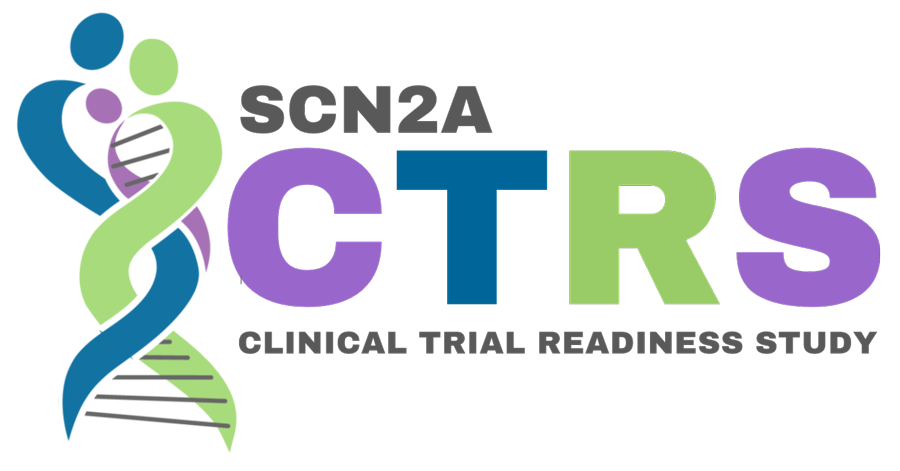
To determine the performance of specific functional, adaptive behavior, and related measures, over time in children with SCN2A-DEE. This study will provide information on the stability of these measures over time and the extent to which they change with age. For therapeutic trials in which these measures could be used as primary or secondary outcomes, the data from this study will provide the basis for designing an efficient and robust trial.
This study is underway and not accepting new applicants. Click here to see preliminary results. Participants are starting to cross the finish line and researchers are already asking for the data!
Thank you to all who are participating in this important study. Please take the time to keep up with your surveys and interviews by logging into SCN2ACTRS.study. For questions, contact SCN2ACTRS@SCN2A.org.
Interview with the SCN2A CTRS Primary Investigator:
Go to Interview
Recent publication in Epilepsia discussing need for better measurements for SCN2A:
View PDF
Video to better understand different types of data and the purpose of each:
Watch Video

The FamilieSCN2A Foundation is excited to be included in a grant that Duke University and COMBINEDBrain have received from the FDA for a tool to measure communication ability, called the Observer-Reported Communication Ability (ORCA) measure. Press Release.
This is a new interview study seeking caregivers of children with SCN2A related disorders. We are looking for caregivers of children with SCN2A to participate in a 1 hour phone interview to discuss their child's communication abilities and complete and provide feedback on a communication survey we've designed.
You may be eligible for this research study if you are:
- A caregiver or parent of a child between the ages of 1 and 18 with a diagnosis of SCN2A
- Are able to speak and read English
- Are able to participate in a 1 hour interview conducted via phone, Zoom or Webex. Interviews will be recorded and transcribed. Participants will be compensated for their time. For more information email EORCAStudy@dm.duke.edu
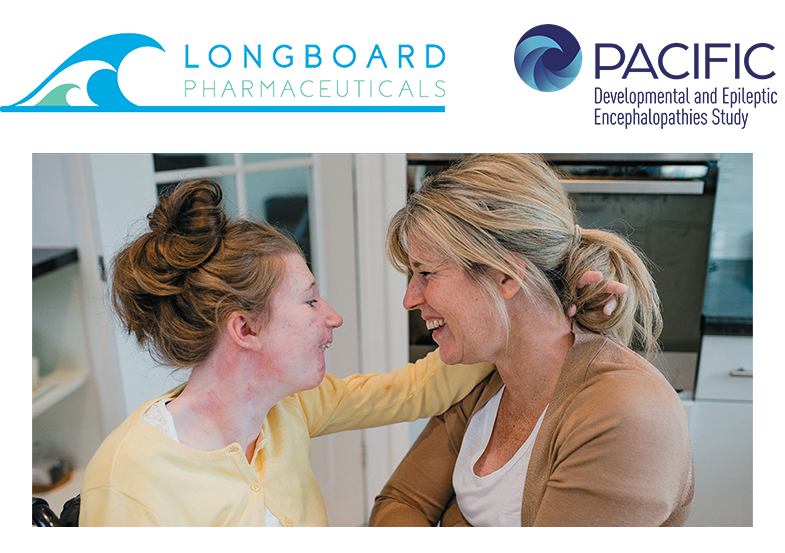
Now enrolling: the PACIFIC study for the treatment of adults with developmental and epileptic encephalopathies
Frequent epileptic activity associated with developmental and epileptic encephalopathy (DEE) can have a profound negative impact on brain development. This may cause motor impairment and may have a large impact on patients’ quality of life.
Longboard Pharmaceuticals, Inc. is studying an investigational drug for patients who have DEE. The purpose of this clinical study is to test the safety and tolerability of multiple doses of the investigational drug, LP352 and find out how LP352 works when given in addition to antiseizure medication in adults with DEE. This study will consist of 10 to 11 visits over a period of 22 weeks.
Participants may qualify for this study if they:
- Are 12 to 65 years of age
- Have been diagnosed with developmental and epileptic encephalopathy (DEE)
- Are currently taking 1 to 4 antiseizure medications at a stable dose
- Have a reliable caregiver
To learn more about the PACIFIC study, visit: www.pacificclinicalstudy.com
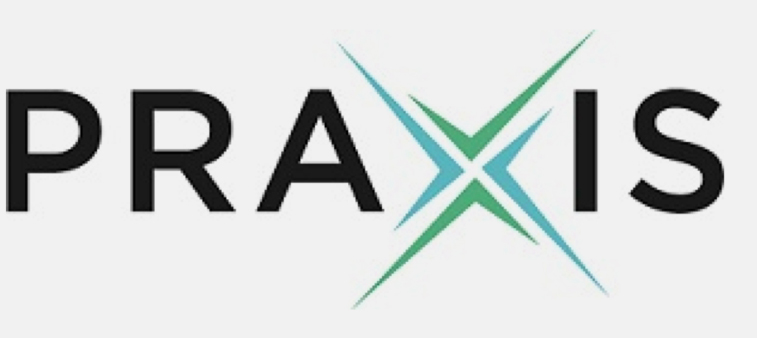
We’re excited to announce a new development related to our planned EMBRAVE study (PRAX-222), known as EMBRAVE, which is specifically designed for early onset children with gain-of-function SCN2A epilepsy. EMBRAVE (PRAX-222) is planned to launch later this year, and eligibility for that study may require three months of recent electroencephalogram (EEG) data as well as seizure diaries. Patients residing the United States with early-onset SCN2A-DEE now have an opportunity to participate in a preliminary assessment of their condition called the SCN2A EEG Observational Study, which involves at-home collection of this information that could provide information that may facilitate later enrollment in EMBRAVE (PRAX-222).
Who is eligible to participate in the study?
- Males or females, ages ≥1 to ≤16 years old
- Residents of the United States
- Diagnosed with SCN2A variant through genetic testing
- Had seizure onset within the first month of life
- Had 8 or more motor seizures in the last 4 weeks
What does participation involve?
During the study, information such as EEG data and seizure diaries will be collected fully remotely (i.e., in the home setting) at specific time points. Enrollment in the SCN2A EEG Observational Study is not a prerequisite for entry into EMBRAVE (PRAX-222). However, data from the Observational Study may facilitate later enrollment into EMBRAVE.
To learn more and see if your child may qualify, visit: https://scn2a.com/clinical-research-studies/scn2a-eeg-observational-study/

Invitae/Ciitizen provides a free service that gives patients & caregivers an electronic format for collecting and organizing their complete health history. By joining Invitae/Ciitizen and sharing your medical records as part of the study, your data may help develop new therapies & options for the SCN2A community.
Learn More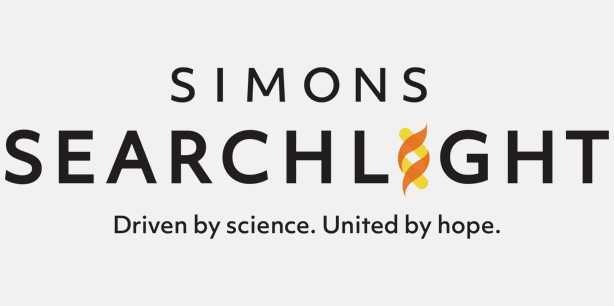
The purpose of this study is to recruit individuals and families with specific genetic changes of interest, including SCN2A. These genetic changes may be associated with autism spectrum disorders (ASD) and other developmental disorders. For this study information about development, behavior, and medical history is collected through surveys and phone interviews. Simon’s also offers a biobank to store blood and saliva samples for research purposes.
SCN2A Registry Snapshot
The Channelopathy-Associated Epilepsy Research Center, led by Alfred George, Jr., MD, chair and Professor of Pharmacology, is investigating sodium and potassium channel genes, the dominant class of genes responsible for early childhood-onset epilepsy. The center consists of a collaborative group of investigators at five academic medical centers, including Northwestern University, three free-standing research hospitals and three industry partners. There is active research on SCN2A including studies to determine the functional consequences of more than 100 variants, development of new cellular and mouse models, and efforts to submit results from this research into the ClinVar database for public access.
Scn2a mouse models recently published or in development
Scn2a-p.K1422E: The K1422E variant was knocked-in to the mouse Scn2a gene using CRISPR/Cas9 genome editing. Scn2a-K1422E/+ mice exhibit rare spontaneous seizures, interictal EEG abnormalities, altered seizure thresholds, reduced anxiety-like behavior and alterations in olfactory-guided social behavior. See the following paper for more details: https://doi.org/10.1093/hmg/ddac087
Scn2a-p.E430A: The E430A variant was knocked-in to the mouse Scn2a gene using CRISPR/Cas9 genome editing. Scn2a-K1422E/+ mice exhibit infrequent spontaneous seizures and altered seizure thresholds. Comprehensive characterization is ongoing.
Constitutive Scn2a knockout mouse model, with heterozygotes modeling SCN2A haploinsufficiency.
The first coding exon of mouse Scn2a was knocked-out using homologous recombination. See the following paper for more details: https://doi.org/10.1016/S0006-3495(00)76829-9
Conditional Scn2a knockout mouse models.
Two loxP cassettes flanking Exon 2 of mouse Scn2a were introduced by homologous recombination. See the following paper for more details: https://doi.org/10.1038/s42003-018-0099-2
Two loxP cassettes flanking Exon 2 of mouse Scn2a were introduced by homologous recombination. See the following paper for more details: https://doi.org/10.1016/j.neuron.2019.05.037
Two loxP cassettes flanking Exons 4-6 of mouse Scn2a were introduced by homologous recombination. See the following paper for more details: https://10.3389/fnmol.2019.00145
Scn2a hypomorphic mouse model with ~25% of the wild-type level of Scn2a expression.
A gene-trap approach was used to generate mice with Scn2a deficiency. See the following paper for more details: https://doi.org/10.1111/gbb.12725
Scn2a mouse model with p.K1422E variant.
The K1422E variant was knocked-in to the mouse Scn2a gene using CRISPR/Cas9 genome editing. See the following paper for more details: https://doi.org/10.1093/hmg/ddac087
Scn2a mouse model with p.A263V variant
The A263V variant was knocked-in to the mouse Scn2a gene using homologous recombination. See the following paper for more details: https://doi.org/10.1172/jci.insight.89810
Scn2a mouse model with p.R1882Q variant.
The R1882Q variant was knocked-in to the mouse Scn2a gene using homologous recombination. See the following paper for more details: https://doi.org/10.1172/JCI152079
Scn2a mouse model with p.R102X variant.
The R102X variant was knocked-in to the mouse Scn2a gene using homologous recombination. See the following paper for more details: https://doi.org/10.1038/s42003-018-0099-2
Scn2a mouse model with Δ1898 protein truncation variant.
The Δ1898 protein truncation variant was knock-in to the mouse Scn2a gene using CRISPR/Cas9 genome editing. See the following paper for more details: https://doi.org/10.1172/jci.insight.150698

Gene therapy approaches for the conversion of premature termination codons (PTCs) in SCN2A are currently limited. Christopher Ahern, PhD, and colleagues have developed a universal approach whereby engineered transfer RNAs (tRNAs) can be used to efficiently correct SCN2A PTCs in vitro and in vivo. Their current preclinical study will employ an adeno-associated virus to deliver these small RNA therapeutics to induced pluripotent stem cell-derived cortical cells from individuals who are known to have nonsense mutations in SCN2A to begin to overcome existing technical challenges for a one-time cure for SCN2A channelopathies that involve PTCs.

FamilieSCN2A is proud to announce the support of a collaborative research project in Dr. Kathrin Meyer and Dr. Nicolas Wein laboratories at Nationwide Children’s Hospital, Columbus, Ohio, USA. Dr. Meyer’s laboratory concentrates on disease modeling of neurodegenerative and neurological diseases with a strong translational focus. Moreover, Dr. Meyer and Dr. Wein develop Gene Therapies for neurological and neuromuscular disorders using small RNA based approaches to increase full length protein expression or decrease production of toxic RNAs. Dr. Meyer and Wein are characterizing multiple SCN2A mutation carrying cell lines that have been collected from patients over the last year. They will develop a robust assay for drug screening and testing of new therapeutic strategies using these cells. They will also perform expanded compound testing and work on understanding underlying disease mechanisms in more detail. Finally, they will develop and test gene therapy approaches on the different patient cell lines.
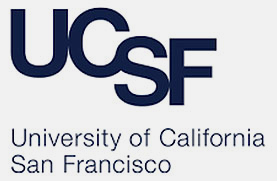
Ahituv and Bender Labs
Exome sequencing studies for autism spectrum disorder (ASD) have identified variants in SCN2A as being among the most common risk factors for ASD1. SCN2A encodes the alpha subunit of the voltage-gated sodium channel NaV1.2, which plays a role in neuronal excitability, particularly during early development. Using Scn2a heterozygous mice, the laboratory of Kevin Bender at the University of California, San Francisco showed that Scn2a haploinsufficiency leads to deficits in neuronal excitability during early development, as well as deficits in synaptic function that persist into adulthood (Spratt et. al Neuron 2019). The specific aims of this proposal are:
In this proposal, the Ahituv and Bender lab use these mice as a tool to test a CRISPR activation (CRISPRa) therapeutic for Scn2a, upregulating the existing functional copy in these mice and analyzing the phenotypic consequences of this upregulation. Results from this study (Tamura et. al BioRxiv 2022) suggest that CRISPRa can be used as a therapeutic tool to rescue deficits in Scn2a haploinsufficient mice in vivo.
Sanders Lab
The lab of Stephan Sanders, PhD, is determining the nature and function of the SCN2A mutation in autism spectrum disorder. SCN2A is a gene that encodes a sodium channel that is critical for communication between brain cells and has been shown to be important for both ASD and infantile seizures. This study will first use an animal model to examine how disruption of SCN2A function at different times in development affects other genes known to play a role in autism. They will also work with collaborators at UCSF to compare the behavioral and medical features of people with this mutation and autism compared to those without an autism diagnosis. This will help identify the more precise role of this mutation in autism. Eventually, this model could be used to test therapies that might improve symptoms in both people with the SCN2A mutation and those with other causes of ASD.

Neurocrine Biosciences Gains Rights to XEN901, a Clinical Stage Selective Nav1.6 Sodium Channel Inhibitor, Being Developed for the Treatment of Epilepsy
Read MoreFeedback from the FDA suggests that Neurocrine may be able to advance XEN901 directly into a Phase 2, or later stage, clinical trial examining efficacy in pediatric patients with SCN8A-EE, without requiring an adult clinical trial first. Neurocrine is currently in the process of completing a pediatric formulation of XEN901 and juvenile toxicology studies to support pediatric development activities. Neurocrine intends to run a Phase 1 pharmacokinetic (PK) study in adults with the new pediatric formulation beginning late in the third quarter of this year, and then initiate a Phase 2/3 clinical trial in SCN8A-EE patients. More details about the final trial design, anticipated timing, criteria, and endpoints will be disclosed over the coming months.
Press Release
XEN901 Info:
Neurocrine is developing XEN901, a potent, highly selective Nav1.6 sodium channel inhibitor, for the treatment of epilepsy. A randomized, double-blind, placebo-controlled Phase 1 clinical trial to evaluate XEN901’s safety, tolerability and pharmacokinetics is ongoing. Thus far, safety, tolerability and PK for XEN901 are supportive of further development. Neurocrine expects to test XEN901 in both adult focal epilepsy as well as in SCN8A (Nav1.6) gain-of-function epilepsy (EIEE13), based on feedback from regulatory agencies. Neurocrine expects to submit a regulatory package to propose development of XEN901 in EIEE13 by the end of 2018.
Nav1.6/1.2 Dual Inhibitors:
Neurocrine is also developing additional compounds that are potent, selective blockers of both the Nav1.6 and Nav1.2 sodium channels, also for the treatment of epilepsy. These molecules are at the preclinical stages of development and if supported by the preclinical data, a Phase 1 clinical trial could be initiated in the next few years followed by efficacy studies potentially in SCN2A (Nav1.2) gain-of-function epilepsy (EIEE11) patients. Neurocrine will continue to provide updates as these molecules advance into and through clinical development.
Dr. Michael Coulter was awarded the Visionary Poster Award at the 2023 SCN2A Family & Professional Conference for his presentation: "A Rat Model of SCN2A Haploinsufficiency: Behavior and Neurophysiology". Watch Now
These are clinical trials for epilepsy in which SCN2A patients with seizures may be eligible to participate. This list is provided courtesy of the Mid-Atlantic Epilepsy and Sleep Center in Bethesda, Maryland, but the trials may have other sites closer to you. If you are interested, please contact the MAESC clinical trials team at 301-530-0046 or email Amanda Pong, MD (ponga@epilepsydc.com), Arkady Barber (barbera@epilepsydc.com) and Salman Hasmi (hashmis@epilepsydc.com). Copy all three of them if you choose to use email.
Clinical trials in epilepsy / See if you qualify
Mid-Atlantic Epilepsy and Sleep Center, LLC
6410 Rockledge Drive, #610
Bethesda, MD 20817
Phone: 301-530-9744
Fax: 301-530-0046
Research Coordinators: Arkady Barber and Salman Hashmi
There are several new treatments for epilepsy in development. They can often help patients whose seizures are not completely controlled with their drugs. Learn more below about epilepsy clinical trials at our center.
Clinical trials are performed for patients to gain access to new medications that can provide better seizure coverage with less side effects. All medications are approved by the FDA before they can be available to patients. In order for new medications to be approved by the FDA and available for use, clinical trials are needed before a medication becomes publicly available. These trials are all developed together with the FDA.
Epilepsy patients may be eligible for the following clinical trials at our center. If you are interested, please contact us to see whether this may be a good study for you. Travel reimbursement and compensation will be provided.
For Children and Adults:
SOTICLESTAT
- • TAK-935 works on the cholesterol pathway in the brain to decrease seizures. It also has anti-inflammatory and neuroprotective effects.
- • This is a double-blind, randomized, placebo-controlled clinical trial.
- • Pediatric and adult patients with Lennox Gastaut Syndrome from 2-55 years of age are eligible.
- • The safety, efficacy and tolerability will be studied.
- • The trial duration is about 23 weeks.
CARISBAMATE
- • Carisbamate works in a unique way to combat seizures.
- • This is a double-blind, randomized, placebo-controlled clinical trial.
- • Pediatric and adult patients with Lennox Gastaut Syndrome from 4-55 years of age are eligible.
- • The safety, efficacy and tolerability will be studied.
- • Patients who complete the study may be eligible for an open-label extension trial.
- • The trial duration is about 23 weeks.
LONGBOARD
- • LP-352 works at the serotonin pathway to decrease seizure activity.
- • This is a double-blind, randomized, placebo-controlled clinical trial.
- • Adult patients with developmental epileptic encephalopathies such as Lennox Gastaut Syndrome, Dravet Syndrome, CDKL-5 deficiency disorder, as well as tuberous sclerosis complex from 12-65 years of age are eligible.
- • The safety, tolerability and efficacy will be studied.
- • The trial duration is about 22 weeks.
LORCASERIN
- • Lorcaserin works at the serotonin pathway to decrease seizure activity.
- • This is a double-blind, randomized, placebo-controlled clinical trial.
- • Pediatric and adult patients with Dravet Syndrome from 2 years of age and older are eligible.
- • The safety, tolerability and efficacy will be studied.
- • Patients who complete the study may be eligible for an open-label extension trial.
- • The trial duration is about 15 months.
CENOBAMATE
- • Cenobamate has been an exceptionally effective medication for adults with epilepsy. It has led to seizure freedom in over 20% of patients. It is now being studied for use in children.
- • This is an open label safety and efficacy phase 3 study with open-label extension, where patients can receive the medication after the trial ends, if desired.
- • Children with focal (partial onset) seizures aged 2-17 years old are eligible.
- • Safety and tolerability will be studied.
- • Total duration is about 6 months, followed by open-label extension.
STACCATO ALPRAZOLAM
- • Prolonged seizures or seizure clusters require rapid, effective treatments that can be given easily by a caregiver. This medication (also known as Xanax, which has been used since the 1970’s) will be delivered through a new device where patients breathe in the medication, similar to asthma inhalers. This causes the medication to act very fast compared to other rescue medications.
- • This is an open-label study in patients 12 years and older with prolonged seizures or clusters of seizures.
- • Every participant will receive a single dose of the medication (no seizures required) to study how the medication is absorbed.
GANAXOLONE
- • Ganaxolone has a unique way of targeting the GABAA receptor pathway that may be affected in tuberous sclerosis complex (TSC), and prior studies showed reduction in seizures in TSC patients.
- • This is a phase 3, double-blind, randomized clinical trial to study the effects of ganaxolone on epilepsy in TSC.
- • Patients with TSC, between 1 to 65 years of age, and with epilepsy refractory to > 2 antiseizure medications are eligible.
- • The study duration is about 20 weeks.
- • After the trial, there is an open-label extension, during which patients may receive the treatment at no cost.
OPC-214870
- • OPC-214870 is being evaluated for effectiveness in adults with treatment resistant focal (partial onset) epilepsy.
- • This is a randomized, double-blind, placebo-controlled trial.
- • Patients from 16 and 64 years old, with a diagnosis of focal (partial onset)epilepsy may be eligible.
- • The study is evaluating the efficacy, safety, and tolerability of OPC-214870 50 mg or 200 mg compared to placebo in adults with treatment resistant focal epilepsy.
- • The trial duration is about 10 weeks.
For adults (over age 18 years):
JNJ 40411813
- • Several antiseizure medications are often used to control seizures in an individual and levetiracetam is a commonly used medication. The new drug JNJ 40411813 added to levetiracetam increases the response to levetiracetam by 25 times. This trial will study the effects of the drug on seizures in patients treated with levetiracetam or other anti-epileptic drugs.
- • This is a double-blind, randomized, placebo-controlled clinical trial.
- • Adults with focal (partial onset) seizures 18 to 69 years of age are eligible.
- • The safety, efficacy and tolerability will be studied.
- • The trial duration is about 22 weeks.
XEN 1101
- • Xen 1101 works in a new way and has shown very high effectiveness in studies so far.
- • This is the last, large study, a phase 3, double-blind, randomized clinical trial to study the effects of Xen 1101 on seizures in patients with focal (partial onset) epilepsy that is not completely controlled with other drugs.
- • Adults with focal epilepsy 18 to 75 years of age are eligible.
- • The safety, efficacy and tolerability will be studied.
- • Patients who complete the study may be eligible for an open-label extension trial.
- • The trial is about 6 months.
DARIGABAT
- • Benzodiazepines (drugs such as valium) are often used for seizure control, but are accompanied by many side effects including sleepiness. Darigabat works similarly but avoids many of these side effects.
- • This is a double-blind, placebo-controlled trial with an open label extension to assess the safety and efficacy of adjunctive CVL-865 in individuals with drug-resistant focal (partial onset) seizures.
- • Patients with epilepsy with focal onset and motor components for at least two years, average 4 seizures per month for 3 months, between 18-75 years old are eligible.
- • Safety, tolerability, and efficacy of the treatment will be studied.
- • Total duration is about 6 months.
Cannabidiol (CBD) in Adults With ASD
View Trial
